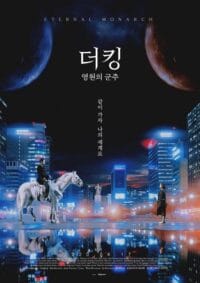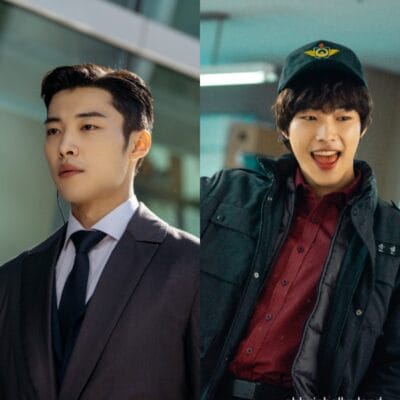K-drama review: The King, Eternal Monarch
 I watched The King, Eternal Monarch (SBS 2020) based on an online recommendation. Like most K-dramas it is enormously long (16 episodes that are 80 minutes each) and I watched it over a few months. I enjoyed it but I definitely have reservations and…questions.
I watched The King, Eternal Monarch (SBS 2020) based on an online recommendation. Like most K-dramas it is enormously long (16 episodes that are 80 minutes each) and I watched it over a few months. I enjoyed it but I definitely have reservations and…questions.
This is a fantasy series based in two parallel worlds: one that’s essentially our modern reality and one where Korea – or rather, Corea – is still ruled by a monarchy. The king of Corea, Lee Gon (played by Lee Min-ho of Boys Over Flowers, Legend of the Blue Sea and many other shows), is a curious mix of modern and traditional. He lives in a large palace in Busan, waited on by subservient staff. He has fancy ceremonial robes and spends his free time practising fencing and riding his beloved horse. But it gradually becomes clear this is also a world with cars, mobile phones, internet and all the other familiar aspects of modern life.
In the first episode we see a flashback to 1994 when Lee Gon witnessed his uncle Lee Lim (Lee Jung-jin) murder his father in an attempt to seize the throne. Lee Gon was saved by a masked stranger, making him the new monarch at just six years old. The masked stranger disappeared, leaving behind a mysterious ID card. The card belongs to a Detective Jeong Tae-eul and was issued in 2019 – 25 years in the future.
In the “real” South Korea, we’re treated to an exciting police chase in Seoul (on foot, which is way more fun than a car chase). And who is the lead detective? It’s Jeong Tae-eul (Kim Go-eun, who starred in the sweet romantic film Tune In For Love). She lives with her father, who runs a taekwondo academy, and she is pretty badass.
There is a magical doorway between these two worlds but only certain people can use it. Lee Gon happens to be horse riding when he encounters it for the first time, which treats us to the magnificent sight of Lee Min-ho suddenly appearing in a busy Seoul street on a big white horse. Cue slow mo of Jeong Tae-eul facing up to him, camera spinning around the two of them like it’s the climax of a Hollywood film.
This scene epitomises the whole series. It’s colourful and glitzy and cheesy, and pretty much hangs on the chemistry between the two leads – which is great. The storyline gets increasingly convoluted while at times dragging. And yet a key plot element introduced in the first episode – how an ID card from 2019 South Korea found its way to 1994 Corea – isn’t brought back into play until the final four episodes and then gets rushed so much I completely lost track.
One aspect that gives this series an unusual spin is that some of the characters have a parallel twin in the other world. In almost every case the doppelganger is living a very different life. Which gives several actors the opportunity to really shine. Or to thoroughly ham it up. Both of which kinda work in such a big-budget, shiny setting. The best example is Woo Do-hwan as Jo Yeong / Jo Eun-sup. Jo Yeong is captain of the Royal Guard of the Kingdom of Corea, and childhood friend of Lee Gon. He’s always serious and speaks very little, and very properly. Jo Eun-sup is a police guard in South Korea, a close friend of Jeong Tae-eul. He’s jolly, chatty and over-familiar. Woo does a great job of playing up the humour without making either of his characters a caricature.

The parallel worlds give the writers an opportunity to talk about Korean history that isn’t really taken advantage of, which I thought was a huge missed opportunity. We do get a few nuggets. The Kingdom of Corea comprises the whole Korean peninsula, there was never a Korean War that split it in two. When a character from Korea passes into Corea for the first time they are astonished that they can just take a train to Pyongyang or any other city in the north. But they don’t. We also learn that the Corean royal family moved their royal residence decades ago from Seoul to Busan as a message to Japan that if Japan invades, the king will be right there at the front with his troops. Which I suspect is a reference to the short-lived Korean Empire, when a monarch-ruled Korea declared independence from China, only to be annexed by Japan 12 years later.
I appreciate that the romance here is grown up, not the coy pecks on the lips some K-dramas would have us believe are the sum total of two adults expressing their love. I like that Lee Gon and Jeong Tae-eul save each other’s lives multiple times. Yes she is sometimes a damsel in distress. But then so is he – or whatever the male equivalent is. And I like that this is a crime thriller as well as romance and fantasy.
I do think the sci-fi fantasy elements got a bit over-complicated on top of having a major crime thread with multiple murders, multiple romances and multiple family dramas. The series is fun for the most part and I think is at its best when it’s funny, or on the lighter side of the action elements. When it gets earnest it’s a little hard to take seriously.